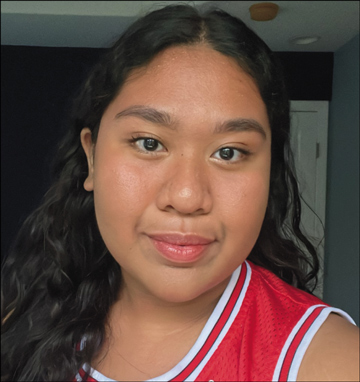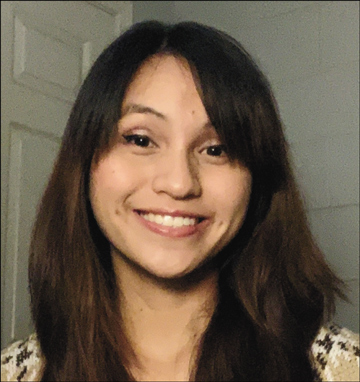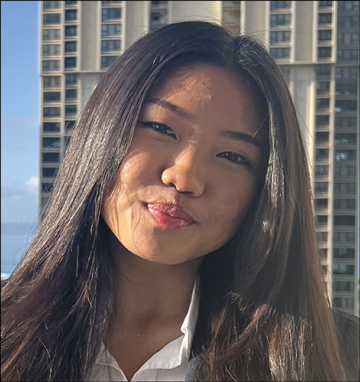
Home Away From Home
Jhanessty Vaye Bautista | Maui High School, Class of 2024
“I’m baboy? No—you a baboy!” My cousin’s broken English and thick Filipino accent causes me and the rest of my cousins to roar with laughter. Feelings of nostalgia flood my mind as the distant memory from my last trip to the Philippines, five long years ago, causes me to miss home. Memories of playing Call of Duty: Mobile, Darts, Pool and then obviously, screaming different words we knew in the other’s language to make each other laugh, are the memories I constantly wish to relive. They are also the memories causing me to feel lonely and almost, guilty in a sense.
Although I have not committed any heinous crimes, the crime of losing the connection with my culture, my family and the place I call home plagued my sleeping thoughts. How could I call myself Filipino if I cannot speak its native tongue? If I don’t always eat their native food? If I don’t know anything about its culture? How can I be Filipino if I’m not in the Philippines? While these fears have been present throughout the past five years, I have learned to embrace them rather than suffer in silence because of them.
I have made an effort to learn Tagalog through the voice of my grandparents and the help of language learning apps. Additionally, I helped my classmate and close friend re-found the Filipino Cultural Club at Maui High School. And of course, I have been busy in the kitchen watching and learning from my parents and grandparents as they make our super-secret and delicious recipes for pork adobo, pancit and so on. Luckily, I’m not alone on this journey. Others on the island have also sought out ways to infuse Maui with our Filipino culture.

Not having been back to the Philippines since the third grade, Roxelle Magliba misses eating her favorite Filipino foods and dishes right at home in the Philippines. “I remember my neighbors just coming around the house yelling fishbol or taho! Sometimes I see my auntie cooking isaw and barbecue. Though Filipino food is made basically everywhere, having dishes from our home country is beyond this world.” While Roxelle has been busy in the kitchen trying to replicate these dishes, her food is not the only thing she’s missed since moving here to Maui. “Though I was born in the Philippines, over time my fluency [in Tagalog and Ilokano] faded,” she explains. By taking the time and practicing Tagalog and Ilokano with her parents, she has been able to reconnect with her culture and build deeper relationships with her family.

Similarly, Genesis Tadena, having been born and raised here on Maui has practiced building deeper relationships with her family through mano po. “Every single time I come home and I saw my dad, he would make me practice mano po. At a very young age, he taught me it was very important to respect your elders and this was one of the ways you could show your respect,” she explains.

Bernadette Acaso illustrates memories of playing pinoy henyo with her family. “When me and my family relatives gather, oftentimes we would play pinoy henyo for fun. The way the game is played is almost the same as charades. This brings us all closer to each other, with all the bonding time, fun moments and unforgettable memories we all make, simply by playing pinoy henyo.” Family is an integral part of life but in the Filipino culture, the importance of family increases by a tenth fold.

Bea Magaoay expresses memories of joy and laughter in the air as she reminisces of moments with her family. The feelings of unity have inspired her to instill more joy and laughter to the community here on Maui. “The Filipino people are known for their Bayanihan spirit and it has instilled in me a deep sense of community and togetherness. I embrace the Bayanihan spirit by participating in community service projects that support the Filipino community or other charitable causes,” she describes.
Filipinos all over the world who have been physically absent from the Philippines have found ways to bring elements of the culture to each of their respective homes. And for me, I have also been born and raised on Maui but recently, I have been lucky enough to realize how the community of Maui has accepted and introduced our culture with loving arms. Although the Philippines will always be home to me, I am glad the island of Maui is another place where I can find these elements of my culture practiced so remarkably. To quote a phrase to encompass any feelings of homesickness, home is where the heart is, and home is here on Maui and in the Philippines.
 Google® Is Not Everything is a monthly column authored by high school students. The title of the column emphasizes education is more than just googling a topic. Google® is a registered trademark. This month’s guest columnist is Jhanessty Vaye Bautista, a Senior at Maui High School. She is a President of Maui High’s Key Club, Vice-President of Maui High’s Filipino Cultural Club, Executive Secretary of Maui High’s Student Government, a member of Blue Thunder, Maui High’s Robotics club, and member of the National Honor Society. Jhanessty is in the ACOM Pathway at Maui High, focusing on graphic design and entrepreneurship. In her free time, she reads books of any and all genres, sketches out designs for her new graphics project, sings karaoke alone or with a group of her close family and friends and loves anything with the popular videogame’s Minecraft Bee. She is the daughter of Vanessa and Jhon Boy Bautista.
Google® Is Not Everything is a monthly column authored by high school students. The title of the column emphasizes education is more than just googling a topic. Google® is a registered trademark. This month’s guest columnist is Jhanessty Vaye Bautista, a Senior at Maui High School. She is a President of Maui High’s Key Club, Vice-President of Maui High’s Filipino Cultural Club, Executive Secretary of Maui High’s Student Government, a member of Blue Thunder, Maui High’s Robotics club, and member of the National Honor Society. Jhanessty is in the ACOM Pathway at Maui High, focusing on graphic design and entrepreneurship. In her free time, she reads books of any and all genres, sketches out designs for her new graphics project, sings karaoke alone or with a group of her close family and friends and loves anything with the popular videogame’s Minecraft Bee. She is the daughter of Vanessa and Jhon Boy Bautista.
